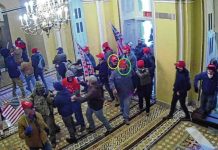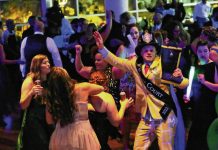One Martin Luther King Jr. Day speaker passionately called for a Columbus audience to reconsider a too-passive, watered-down image of the late civil rights leader.
Instead, he suggested they remember King as a fiery rebel who battled American economic and other national elements far beyond racism of the 1950s and 1960s.
Christopher Hunt’s remarks Monday night surfaced amid the seven-month-old Black Lives Matter of Columbus chapter’s largest meeting ever with 150 people of various races, backgrounds and ages at the Unitarian Universalist Congregation of Columbus building on Goeller Boulevard.
The gathering was titled, “Reclaiming the Legacy of Dr. Martin Luther King Jr.”
[sc:text-divider text-divider-title=”Story continues below gallery” ]
“I was asked to come today and offer my thoughts and insights pertaining to the now-decades-long phenomenon in which Dr. King, who was once understood to be the most dangerous person in the U.S. by the Federal Bureau of Investigation, was quickly shaped into a type of national mascot for sentimental race relations, apolitical acts of goodwill, and superficial calls for love and brother/sisterhood,” Hunt said.
The Indianapolis resident is a Northwestern University doctoral religious studies student who often explores the intersection of philosophical, theological and racial elements of society.
The speaker offered that many national commentators’ references to King in recent years “reduce him to a national do-gooder, a symbol of a type of white-liberal volunteerism and charity that stops short of asking the hard questions, those King-like questions such as: What is it about our capitalist system that directly contributes to the rates of homelessness and poverty in our country?
“… What are we to make of the normalization of black death in our country, as police agencies are able to murder black people with impunity, and even on tape?”
More than once, Hunt quoted philosopher and activist Cornell West’s description of the phenomenon of making King more palatable for mainstream America as “the Santa Claus-ification” of the clergyman. He said it’s imperative that people work toward “reclaiming a legacy that is absolutely necessary in our moment.”
Also at the event, Aimee Zoeller, a lecturer and program coordinator for sociology and women’s studies at IUPUC, examined the background of civil disobedience of King and others such as Rosa Parks in the civil rights movement. From the outset of her comments, she put the audience at ease, assuring them they need not feel ignorant of some of the background and success of such noted leaders.
They were leaders, she quickly asserted, who hardly became bold citizens overnight, despite the way much modern history is recorded.
“I was a college instructor before I knew that Rosa Parks had any training in social disruption,” Zoeller said. “Not a college student. A college instructor.”
In part, she highlighted the Highlander Folk School, now the Highlander Research and Education Center in New Market, Tennessee, where King, Parks and others learned in classes to nudge forward a movement. The school became a linchpin of social justice training of King’s day, and so frightened many white state leaders that they had it temporarily shut down in 1961, claiming at one point that it was a house of prostitution.
“A radical activist cannot be created without radical institutions,” Zoeller said.
Indianapolis spoken word artist Mariah Ivey opened the evening with a high-energy, rhyming, rapid-fire recitation titled “Black Lives Still Matter.”
“Yes, all lives matter,” Ivey said later in the evening. “This wasn’t created to say only Black Lives Matter.”
The gathering also included chapter organizer and chairwoman Brittany King’s perspective on the late, and not related, King — and her realization that the minister began some of his social justice work at the same age she now is — 27.
Plus, her father, Fred King, offered memories and struggles of growing up in black neighborhoods of Birmingham, Alabama, amid Jim Crowe laws that segregated blacks to the back of city buses and to black-only establishments.
[sc:pullout-title pullout-title=”What’s next” ][sc:pullout-text-begin]
The next meeting of the chapter of Black Lives Matter of Columbus, open to all, will be from 6 to 8 p.m. Jan. 26 at The Living Room, 1412 Sycamore St. in Columbus.
Topics will range from launching a website to building relationships in the community, according to organizers.
The chapter includes people of all races and backgrounds.
Information: Facebook page at Black Lives Matter of Columbus.
[sc:pullout-text-end]




